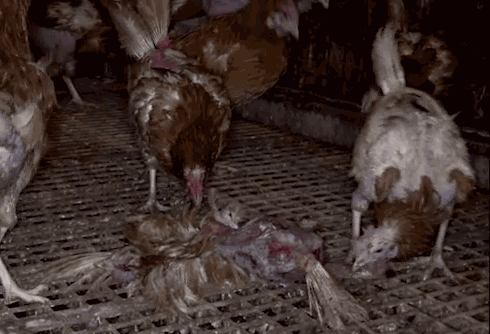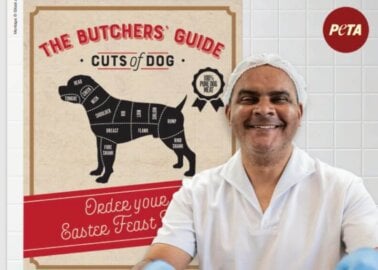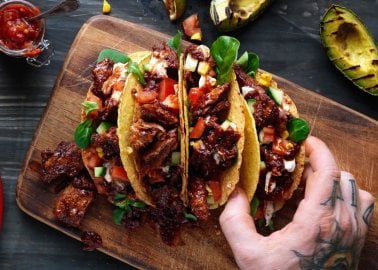Why Are We Still Eating Animals in the Midst of a Global Pandemic?
The COVID-19 pandemic has changed almost every aspect of life as we know it. According to experts, the novel coronavirus likely originated in a market in China’s Hubei province, where a vast number of species who would naturally never encounter each other – including bats, pangolins, wolves, peacocks, snakes, badgers, and more – were crammed together, slaughtered, and sold for human consumption.
Much like swine flu (H1N1), bird flu, and SARS (another coronavirus linked to a Chinese market), scientists suspect that humans first contracted the new coronavirus by eating or touching an infected animal.
It’s not unusual for viruses and other pathogens to spread from animals to humans. According to the US Centers for Disease Control and Prevention, 75% of new or emerging infectious diseases originate in animals. Kevin Olival, a disease ecologist and conservationist at EcoHealth Alliance, says, “When you bring animals together in … unnatural situations, you have the risk of human diseases emerging.”
Put differently, many devastating disease outbreaks arise because humans house animals in filthy, severely crowded farms and markets – breeding grounds for pathogens – in order to satisfy their meat habit.
But while it might be easy point the finger at China, doing so is neither fair nor helpful. There are disease-ridden animal facilities around the globe, including right here at home. In the UK, billions of animals are killed for their flesh every year, after living in abject fear, pain, and horror.
British ‘Mega-Farms’
Britain has nearly 800 “mega-farms”, meaning they house at least 40,000 birds or 2,000 pigs in close confinement, as well as industrial-scale intensive farms scattered across the countryside.
These animals are tightly crammed into cages, barren sheds, or concrete barns, with virtually no access to the outdoors or opportunity for mental stimulation. Many will never see sunlight. Chickens raised for meat each live on a patch of floor no larger than an A4 piece of paper. It is difficult for these inquisitive, social animals to spread even a single wing, let alone engage in any natural behaviour.
Pigs fare no better. Mother pigs are repeatedly artificially inseminated, spending most of their life in some form of filthy cage until they are no longer productive and are slaughtered for cheap meat.
Numerous investigations have shown that on factory farms, dead and rotting animals are routinely left among the living, many with untreated injuries. Cannibalism may result from frustration and unnatural group sizes. Millions of animals die before they reach the abattoir, victims of the industry who aren’t even officially counted by the government.
 casperhilt
casperhilt
Human demand for meat causes huge numbers of animals to be crammed together on crowded, faeces-ridden farms; transported in filthy lorries; and slaughtered on killing floors soaked with blood, urine, and other bodily fluids. Pathogens flourish in such conditions.
Antibiotic Resistance
To make them grow quickly and keep them alive in disease-ridden conditions that could otherwise kill them, animals on factory farms are routinely fed antibiotics. This causes a number of problems, the most worrying being the development of bacteria resistant to the antibiotics that we rely on to fight infections. According to the OECD, “agriculture accounts for over 75% of annual antimicrobial consumption in the EU and the US.”
We are playing a dangerous game. At our current rate, experts believe that by 2050, more people will die from antibiotic-resistant diseases than from cancer.
Infection
Salmonella and E. coli are also more common on intensive farms. Chickens grown unnaturally large in just 42 days experience a high level of stress that makes them more susceptible to Campylobacter infection, too, which is easily passed to humans in chicken flesh and is “the most common bacterial cause of human gastroenteritis in the world“, according to the World Health Organization. Long-distance transport of animals to slaughter further increases the risk of infection.
Given the huge population of animals living on factory farms in the UK and around the world, we are leaving ourselves vulnerable to further catastrophic disease outbreaks and pandemics.

What You Can Do
As China finally beings to lift lockdown restrictions, the UK looks forward to the same freedom in a couple of months’ time. When we emerge into this new world, it’s imperative that we prevent future, even deadlier pandemics by ending the demand for animal-derived foods and choosing a vegan lifestyle.
Together, we must show a new respect for our planet and each other. Making kinder, more compassionate consumer choices will save human and animal lives.
Check out PETA’s recipes as well as our vegan food guide to get you through self-isolation. And don’t forget to order a free vegan starter kit to kick-start the new you post–COVID-19!



